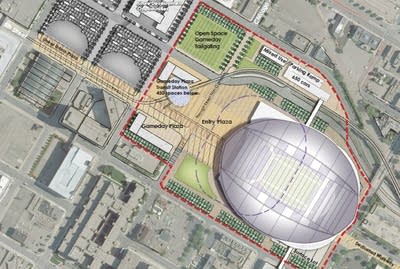New Vikings stadium funding deal expands gambling
Go Deeper.
Create an account or log in to save stories.
Like this?
Thanks for liking this story! We have added it to a list of your favorite stories.

Negotiators working on a Vikings stadium struck a deal over the weekend that may settle questions about charitable gambling and whether it can help pay for a stadium.
The deal expands gambling beyond just electronic pull tabs and lays out who will pay if gambling doesn't raise enough money to pay the state's share of a proposed stadium in downtown Minneapolis.
The deal changes the state tax structure on charitable gambling and legalizes sports-themed tipboards, a common and illicit form of gambling, typically related to football games. That's in addition to the electronic pull tabs that Gov. Mark Dayton proposed.
ANOTHER REVENUE STREAM
Turn Up Your Support
MPR News helps you turn down the noise and build shared understanding. Turn up your support for this public resource and keep trusted journalism accessible to all.
The additional gambling is aimed at doubters who had questioned whether electronic pull tabs could pay for a $400 million state share of a $975 million stadium. Charitable gambling operators said there wasn't enough return from the plan for them, and they threatened to not even adopt new electronic games.
"There just wasn't enough money in it for everybody," said Rep. John Kriesel, R-Cottage Grove, who sponsored a bill to legalize electronic pull tabs last year.
Rep. Joe Hoppe, the House Commerce Committee Chair, said the deal would bring in proceeds on top of the expected $72 million a year the state projected for electronic pull tabs in December.

"One of the things we proposed is giving charities the ability to use tipboards to have another game to make more money, and also give them some tax relief," Hoppe said. "The NFL and the Vikings were not comfortable with the idea of using tipboards to help fund a stadium."
The charities trade group, Allied Charities of Minnesota, has been angling for the tipboards for years. The tipboards are legal now in limited form, but a sports-themed game would allow players to buy a random chance at matching, for instance, a pair of digits in the score of a football game. The connection with NFL games has made it a popular, albeit illicit, game for spectators at bars where the games are televised.
"We think its something that will be of great interest, said King Wilson, executive director of the charities trade group. He said a state estimate of the potential revenue nearly a decade ago put tipboard proceeds at about $10 million a year. He now thinks that it could be as high as $14 million or $15 million a year.
"I think it helps out a lot," Wilson said.
Vikings Vice President Lester Bagley said he'd heard about the plan, but didn't know all the details about it. Although football tipboards typically involve only numbers, not who wins or loses a game, he said the NFL would probably have to weigh in on the matter. The league frowns on sports betting directly connected with the game's finances.
CONTINGENCY PLANS
Charitable gambling finances were only one of the obstacles blocking passage of the stadium bill at the Capitol. Doubters also wanted assurance that taxpayers wouldn't be on the hook if pull tab taxes didn't raise enough money to pay Vikings stadium bonds, which will initially cost the state more than $35 million a year.
"We didn't like this bill because we never wanted general fund money being used to pay for any part of this," Hoppe said. "As it was, the general fund was the main backstop for these bonds."
An amendment to a bill introduced at the Capitol earlier this year stipulates where else the money would come from if charitable gambling doesn't pan out.
The backups would include, in order:
• A tax on luxury boxes;
•A sports-themed lottery game;
•Reserve funds from Hennepin County sales taxes used to build Target Field;
•An admissions tax at the stadium.
Gov. Mark Dayton has said that he has confidence in the projected proceeds from electronic pull tabs, put at about $72 million a year, and that even if the number were off by a third, there would be enough money to cover the state's cost.
VIKINGS NOT COMPLETELY PLEASED
But Bagley, the Vikings vice president, said the Vikings don't like to see stadium revenues listed in the backup plan.
"We're grateful that they're moving forward with the proposal and moving forward with the discussion at the Capitol," Bagley said. "But we don't agree with the principal that the team should backstop the state's contribution. You know, the Vikings are in for $427 million up front, the third-largest private contribution in NFL history. We've agreed to $13 million a year to pay operating costs, and that's the largest rent payment in the league."
The Vikings will be making their case to the House Commerce Committee Monday night, where debate is expected to be limited to the charitable gambling aspect of the deal. A hearing on the stadium itself is likely to come later, possibly in the Government Operations and Elections Committee.
Hoppe said that's likely to mean the House won't be adjourning by April 5, as some lawmakers had been suggesting last week.
"I think if everything is done that we wanted to get done, I think I'd be done, and House leadership would be more than fine being done on April 5th," Hoppe said. "The only issue is that I don't think we are going to get everything done by then."
The stadium plan also needs to get moving again in the Senate, where it was tabled in committee last month.



